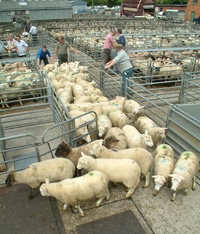Strong export trade is opportunity for lamb producers

Hill farmers with lambs to sell this autumn are facing a dilemma. As the store lamb market continues to strengthen – with prices described by some buyers this week as “off the clock” – there’s a strong temptation to turn lambs into cash now.
But with a booming export trade for lightweight lambs, even richer pickings could be on the cards for finishers.
The big question is how best to squeeze the highest margin from horned lambs. Pundits say the influence of the southern European market on the UK lamb trade in the run up to Christmas could hold the answer.
Lightweight hill lambs for the export trade are currently making around £3.30/kg deadweight – that means 13kg lambs are worth almost £43 – but some say this trade could get even dearer.
Exporters are “clamouring” for lightweight lambs and the coming weeks are expected to see a big upsurge in demand for 8-14kg lambs to ship to Italy, Portugal, Greece and especially Spain.
Hill farmers toying with their marketing options are being advised to make careful assessments of the type of lambs they have to sell, the resources they have in terms of keep and whether or not they feel spending on supplementary feed will provide a higher margin than if they sold lambs as stores.
Selling trends among producers have changed as the season has progressed. County Durham Swaledale breeder Martin Wilson of Middleton-in-Teesdale opted to sell most of his stronger lambs – including some by Texel and Cheviot sires – as stores.
“It’s just a decision you have to make, but we’ve been averaging almost £40 for store lambs. That’s a decent return without having any feed costs or having to wait until next year to cash them in. We’ve put the smaller lambs inside on ad-lib cake so we’ve hedged our bets to some extent,” said Mr Wilson.
But the lively export market for lightweight horned lambs is encouraging more producers to hold on to their smaller lambs and spend on feed to achieve the fleshing the trade demands.
Wyn Williams, sheep procurement officer with Dunbia, urged hill farmers to look carefully at the type of lambs they had to sell to ensure they achieved the best return from the various marketing options.
“We anticipate a strong demand for lightweight lambs – 8-14kg – from Portugal and Spain as we approach Christmas but they need to be well-fleshed and not razor-backed. Farmers with this type of lamb could earn a better margin targeting them at this market rather than selling them as stores.
“We expect the demand for smaller lambs to diminish in the New Year but producers with hill lambs to sell should look carefully at all their options.”
Although UK slaughterings are forecast to be around 15,500,000 – that’s down by about one million lambs on the year – it’s the export trade that looks like having the biggest impact on prices.
A fierce demand for hill-bred lambs has sent prices rocketing in the Lake District where Herdwick-cross lambs topped a store sale at Cockermouth Auction Mart this week at £48.50 apiece. Prices at the market’s prime lamb sale have also been “remarkable”, according to auctioneer Adam Day, with pure Swaledale wether lambs weighing 36kg making £48.
“A lot of stronger horned lambs are being away wintered in anticipation of a good hogget trade to match last year, but the big talking point is what to do with the lightweight lambs.
“If a producer is happy with what he can get in the store ring then he should probably sell his lambs and take the first profit. But there’s every suggestion that the light lamb market is going to get even stronger in the coming weeks – and that’s encouraging some producers to spend on feed to put some meat on these smaller lambs.
“It doesn’t look like there’s going to be any shortage of export buyers up to Christmas,” says Adam Day.
Lake District sheep producer Keith Ireland of Ennerdale said the sheep market was currently a “win-win situation” for hill farmers. “We don’t take any winter keep and so we’ve sold all our pure Swaledale wethers. The best finished lambs have reached £48.50 and the smaller stores – that have had no feeding – sold to £38.50. You can’t grumble at that,” said Mr Ireland.
